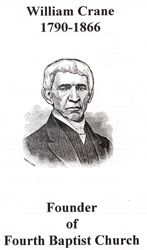 Southern Baptists’ Foreign Mission Board, located in the Confederate capital of Richmond, Virginia, has been decimated by the war and forced to pull back from its foreign operations. Communication with missionaries on foreign fields is severed, while the ability of the Board to pay missionaries’ salaries has been compromised by both the lack of contact and spiraling Confederate inflation. The communications and financial challenges reflect the broader reality of the increasing isolation of the Confederate nation, and collectively have resulted in a drastic reduction of foreign missionary numbers and efforts.
Southern Baptists’ Foreign Mission Board, located in the Confederate capital of Richmond, Virginia, has been decimated by the war and forced to pull back from its foreign operations. Communication with missionaries on foreign fields is severed, while the ability of the Board to pay missionaries’ salaries has been compromised by both the lack of contact and spiraling Confederate inflation. The communications and financial challenges reflect the broader reality of the increasing isolation of the Confederate nation, and collectively have resulted in a drastic reduction of foreign missionary numbers and efforts.
There is no small irony in the faltering of the Foreign Mission Board, however. When the Southern Baptist Convention and its Foreign Mission Board were founded in 1845 in order to preserve African slavery, Southern Baptist leaders insisted that the wealth of slaveowners was instrumental in Christianizing the heathen peoples of the world. Now, in the war over the future of slavery, the financial lifeline of Southern Baptist foreign mission efforts is in jeopardy not merely in this moment only, but for the long-term future.
The irony grows yet deeper this month when Richard Fuller, pastor of Baltimore’s Seventh Baptist Church and president of the Foreign Mission Board, arranges a temporary fix for the denomination’s wounded mission efforts by setting up a Provisional Foreign Mission Board in Baltimore–a Union state. Fuller allies with the Maryland Baptist Union Association, who hires the venerable William Crane (1790-1866), founder and pastor of Baltimore’s Fourth Baptist Church, to collect and send funds to Southern Baptists’ remaining foreign missionaries.
Ironies? The New Jersey-born William Crane, long residing in Richmond, had moved to Baltimore in 1834 due to his disapproval of slavery. During his years as a Baptist pastor in Baltimore, he preached against laws prohibiting interracial marriage and insisted that the Bible could not be used to justify African slavery. Now, the anti-slavery advocate Crane is entrusted with holding together the organization created by Baptists devoted to the slave cause. Whether or not the Foreign Mission Board will survive the war is, for now, far from certain.
Sources: “History Highlights,” Baptist Convention of Maryland / Delaware (link); “Biography of William Crane,” Baptist Convention of Maryland / Delaware (link); Emir and Ergun Caner, The Sacred Trust: Sketches of the Southern Baptist Convention Presidents, Nashville, Tenn: Broadman & Holman Publishers, 2003, p. 12 (link); “Baptist Heritage Press Releases,” Southern Baptist Historical Library and Archives (link)


